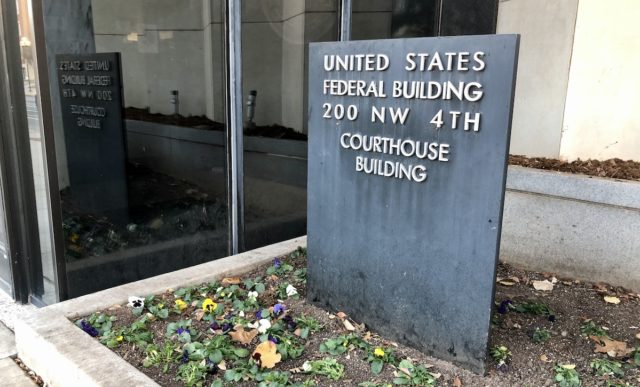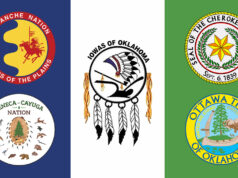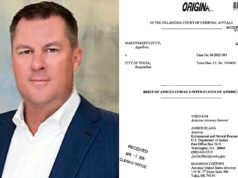
In a case about whether the state or the federal government has regulatory authority over surface mining and reclamation operations on affirmed tribal reservation land following the U.S. Supreme Court’s July 2020 ruling in McGirt v. Oklahoma, a federal judge issued an order Wednesday that ruled in favor of the federal agency.
Embedded below, U.S. District Court Judge Stephen Friot’s order states that the U.S. Office of Surface Mining Reclamation and Enforcement — a branch of the U.S. Department of the Interior — holds sole regulatory authority over surface mining following the July 2020 landmark SCOTUS ruling, because state regulation of surface mining is “now precluded” by a federal law — the Surface Mining Control and Reclamation Act of 1977.
Each party sought a summary judgement from Friot, and he granted the federal government’s motion and denied the state’s.
“Oklahoma seeks to continue regulating surface coal mining and reclamation operations on land within the exterior boundaries of the Creek Reservation, Choctaw Reservation and Cherokee Reservation, as it has done for several decades. However, state regulation of these activities on Indian land is now precluded by SMCRA,” Friot concluded.
The question over which government agency maintains surface mining authority within the boundaries of affirmed tribal reservations has been the first major court challenge regarding matters of civil jurisdiction following the July 2020 McGirt v. Oklahoma decision which functionally affirmed the Indian Country reservations for six sovereign tribal nations in the eastern part of the state.
The SCOTUS ruling affirmed the Muscogee Nation to be an Indian Country reservation as defined under 18 U.S.C. 1151(a). Subsequent court decisions from the Oklahoma Court of Criminal Appeals applied the ruling to the Cherokee Nation, Choctaw Nation, Chickasaw Nation, Seminole Nation and, most recently, the Quapaw Nation.
While the case specifically dealt with jurisdiction over major crimes that occur on tribal lands, some tribal leaders have argued that the reservation designation has implications over property rights, regulations and taxation authority.
Gov. Kevin Stitt’s administration has maintained that SCOTUS’s ruling in McGirt v. Oklahoma is expressly limited to criminal jurisdiction, because civil matters were never litigated in the case. The majority opinion, for instance, begins with the statement, “Held: For [Major Crimes Act] purposes, land reserved for the Creek Nation since the 19th century remains ‘Indian Country.'”
In a statement, Carly Atchison, Stitt’s communication director, reiterated that sentiment.
“We are carefully reviewing the ruling. Notably, the judge explicitly stated that this order ‘should not be regarded as relevant to other situations in the realm of civil law’ other than federal surface mining,” Atchison said. “Gov. Stitt will always stand up to protect Oklahoma from any federal overreach from the Biden administration.”
The case dealt specifically with the three tribes initially covered by the federal agency’s action: the Muscogee Nation, the Cherokee Nation and the Choctaw Nation. While none of the tribes were parties in the case, Brian Danker, the senior executive officer for the Choctaw Nation’s legal division, said the court “faithfully applied the law to reach the proper conclusion.”
“The court’s order denying Oklahoma’s motion for summary judgment reaches the right outcome in a well-reasoned opinion,” Danker said. “I particularly appreciate the order’s attention to the legal analysis of these important issues.”
Friot: ‘A state program is defined to exclude Indian land’
Friot’s order states that the lands in question are Indian lands. As such, “SMCRA plainly precludes a state from administering its state program on the land,” he wrote.
SMCRA allows for states to assume responsibility of surface coal mining enforcement through operation of approved state programs, but “a state program is defined to exclude Indian land,” according to 30 U.S.C. 1253, Friot wrote.
In this event, federal statute 30 U.S.C. 1300(d), (j) gives a tribe the option to apply its own regulatory program, but Friot wrote that “to the extent these provisions leave any doubt as to regulatory authority on Indian land, SMCRA’s implementing regulations clearly state that OSMRE ‘shall be the regulatory authority on Indian land.'”
SMCRA allows for a state to assume exclusive surface mining jurisdiction via submission of a state program for approval by the U.S. Secretary of the Interior. Without a state-approved program, the federal government exercises “exclusive jurisdiction,” according to 30 U.S.C. 1254(a).
“Further, state regulation on Indian land outside of an approved state program would undermine the authority granted to OSMRE and Indian tribes,” Friot wrote.
One of the state’s arguments focused on a 2005 SCOTUS decision in City of Sherrill v. Oneida Indian Nation of New York, which litigated whether the Oneida Nation was part of an Indian reservation and, thus, exempt from local taxation.
The Oneida Nation had sold much of its reservation in the early 1800s but reacquired the land almost 200 years later, subsequently claiming it was exempt from local taxes. The U.S. Supreme Court ruled in an 8-1 decision that because the Oneida Nation has sold the land and because regulatory authority had been exercised by state and local governments for nearly 200 years, the tribe had “relinquished governmental reigns” and was not exempt from local taxation authority.
Friot ruled the Sherill case is inapplicable to the surface mining matter, stating Oklahoma’s case “is instead about the interpretation and application of a federal statute.”
“In the case at bar, the key question is whether the lands in question here qualify as Indian land under SMCRA,” Friot wrote. “They do qualify as Indian land, with the result that state-level regulation of surface mining and reclamation activities within the three reservations is prohibited.”
Background on shift in regulatory authority
On May 18, 2021, the U.S. Office of Surface Mining Reclamation and Enforcement added a notice to the Federal Registry to prevent the state of Oklahoma from exercising regulatory jurisdiction under the Surface Mining Control and Reclamation Act of 1977 on lands of the Muscogee Nation. The notice transferred that authority to the federal government.
Prior to the Federal Registry notice, OSMRE sent letters to the Oklahoma Department of Mines and the Oklahoma Conservation Commission in April 2021 notifying the agencies of the jurisdiction change and to initiate the transfer of paperwork to OSMRE.
The state of Oklahoma and the Stitt administration then filed a lawsuit in July 2021 against the U.S. Department of the Interior and Secretary of the Interior Deb Haaland for “unlawfully attempting to strip Oklahoma of its jurisdiction to regulate surface coal mining and reclamation operations.”
The state filed for a preliminary injunction that would have blocked the Department of the Interior from usurping the state’s regulation of surface mining and reclamation operations, but after state lawyers and federal attorneys delivered their arguments during a Dec. 2, 2021, hearing, Friot denied the state’s request.
His new order this week furthered his initial denial of the state’s request and leaves the federal government in charge of surface mining regulation within the reservations.
Cherokee Nation Attorney General Sara Hill released a statement regarding the federal court ruling.
“This case wasn’t brought by any of the tribes, and we weren’t parties to the litigation,” Hill said. “We do have a long history of working cooperatively with state, local and federal officials to reclaim abandoned mines within our jurisdiction, and remain committed to doing so.”
Read Judge Stephen Friot’s order
